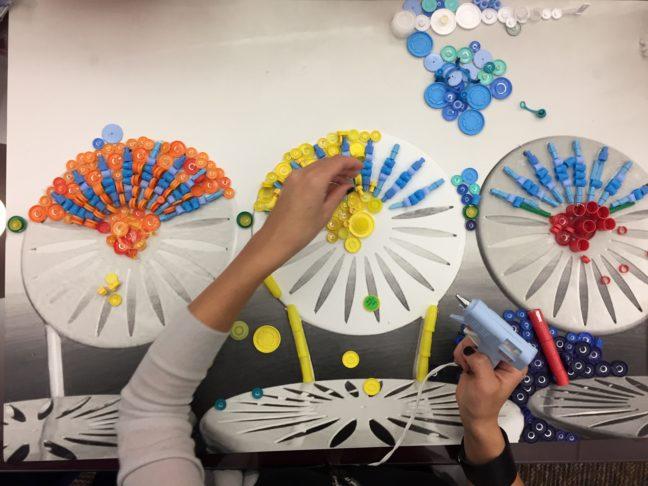Looking to support its commitment to the arts, University of Wisconsin School of Medicine and Public Health started a project creating art from recycled medical waste.
UW School of Medicine and Public Health professor Karin Zuegge and senior art coordinator Mandy Kron began the project in 2016 in an effort to highlight the environmental impact of “hidden” medical waste and to promote sustainability. They continued the project into March 2017, reusing biocaps, which are the tiny plastic caps of medication vials.
Max Christman, sustainability specialist at UW Health, said hospitals are the second-most energy-intensive industry, making up 18 percent of the global economy.
“There are a lot of hidden items in the medical system that are essentially ubiquitous, but produce a lot of waste,” Christman said.
As the medical director for sustainability at UW Health, Zuegge presented the idea of repurposing anesthesia vial caps, Kron said. Although these caps can be recycled, Zuegge wanted to reuse them in a creative and meaningful way, Kron said.
“We wanted to make it happen and we wanted to make it look nice,” Kron said.
Zuegge and Kron collect biocaps from various departments and organize them based on color and size. They reserve conference rooms and invite UW employees to contribute to the project and participate in the process. Bringing people together to work on the project has helped UW Health emphasize their commitment to prioritizing sustainability, Kron said.
“When you see all the caps together and you sort them, you recognize how much waste they produce,” Kron said.
Zuegee and Kron work closely in the anesthesiology department to brainstorm image ideas. The first project was a mural of UW Health’s “Green Steps” logo. Green Steps is a program that creates sustainability initiatives within the organization.
Since 2016, three projects have been completed while another is currently underway. All of the projects reflect a piece of Madison’s culture that is unique.
The second completed project is a colorful rendition of three Wisconsin Union chairs in front of Lake Mendota. The third is a set of anesthesia tools. A depiction of flowers in front of the Capitol is still in the works.
The pieces are located near operating rooms or staff-only areas. They act as a symbol and reminder of sustainability, Kron said.
“The projects are getting a lot of other departments to pay attention to recycling,” Kron said.
Encouraging departments to contribute recycled materials, the organization simultaneously works toward goals of sustainability. Christman said the impact is growing and sets an example for other hospitals around the country.
The art project is a beautiful and effective reminder of reducing waste in the Madison community, Christman said.
“It is enormously important for hospitals to commit to sustainability,” Christman said.


